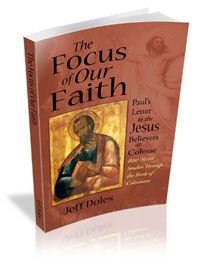Christ is all, and is in all. (Colossians 3:11)
Christ is intimately involved with us in our very being — and always has been. He is, Paul says, “the firstborn over all creation.”
For in him all things were created: things in heaven and on earth, visible and invisible, whether thrones or powers or rulers or authorities; all things have been created through him and for him. He is before all things, and in him all things hold together. (Colossians 1:15-17)
Everything that exists was created
by Christ,
through Christ and
for Christ. All things are created
in Christ, and
in him all things hold together and continue to have being. At Mars Hill, Paul affirmed with the Greek poets that “we live and move and have our being” in God (Acts 17:28). All of us are in God, in Christ our creator. We have ever been so and ever will be.
But the reciprocal is also true: All things are in Christ; Christ is in all things. “Here there is no Gentile or Jew, circumcised or uncircumcised, barbarian, Scythian, slave or free, but Christ is all, and is in all” (Colossians 3:11). This is true not only of the Church but of all people and, indeed, of all creation. Christ is all in all, which is why everyone and everything matters.
Christ is in all creation. This, I have discovered, is difficult for some Christians to accept. For if Christ is in all creation, they reason, then that would mean that all creation is saved. I don’t fault the logic of that; in fact, I accept that conclusion. But they do not like the conclusion, however, and since they do not deny their own logic (they would be refuting themselves by doing so), they instead dismiss the premise and deny that Christ is in all creation.
The Scriptures are clear that Christ is the beginning of all things and that all things are in him. They are equally clear that Christ is also the final resolution of all things: All things in heaven and on earth being brought into unity under Christ, reconciled to God through Christ by the blood of the cross (Ephesians 1:10; Colossians 1:19-20).
It is hard to think of how Christ could be so intimately related to all things, causing all things to be, even to the point of holding all things together in their continued existence, without himself actually being
in them. Indeed, Paul says of the Christ
by whom,
through whom and
for whom all things are created,
in whom all things exist and
by whom all things are reconciled to God — Paul says that this same Christ is
in all things. A literal rendering of the Greek text in Colossians 3:11 identifies him as “the all and in all Christ.”
Christ is
in all creation, but this does not mean that Christ
is the creation. The Christian faith is not a pantheistic one. In his divinity, Christ is the creator of all things and permeates all things, but he is not the same as his creation. Every created thing
has being and is
a being, but Christ as creator is
being itself, the source of being for everything that exists.
Yet, in the Incarnation, when God became a man, Christ became part of his own creation. In him, God joined himself to all humanity and partakes of human nature. And in him, we become “partakers of the divine nature,” as 2 Peter 1:4 teaches — though we do not become God the Father, Son and Holy Spirit. We remain ourselves just as God remains God’s own self.
In his humanity, Christ connected to all of creation, because all creation is itself connected. Through Christ, God is transforming all creation, beginning with us, to conform us to the image of the Son — and this affects all creation.
For the creation waits in eager expectation for the children of God to be revealed. For the creation was subjected to frustration, not by its own choice, but by the will of the one who subjected it, in hope that the creation itself will be liberated from its bondage to decay and brought into the freedom and glory of the children of God. We know that the whole creation has been groaning as in the pains of childbirth right up to the present time. (Romans 8:19-22)
In the end, when all things have come to their fulfillment, we will see that God is “all in all” (1 Corinthians 15:28). This is the unity of all things in Christ. It is the good news of the gospel, which includes you and me and all of creation. Our part is to yield to the transforming power of God’s love that is revealed in Christ and in the hell-shattering depth of his cross and resurrection.


















